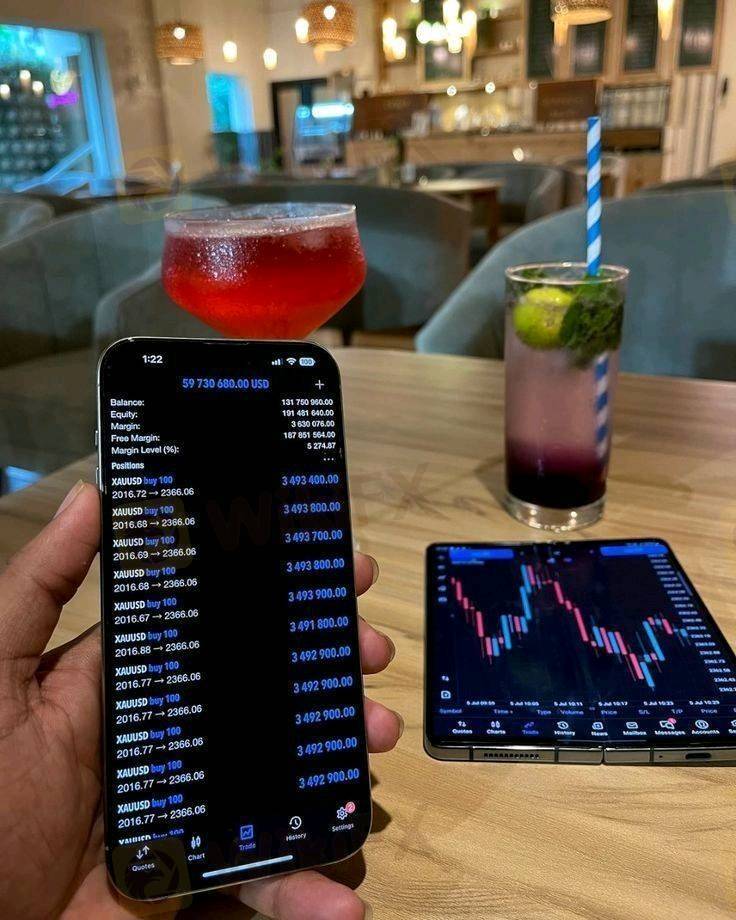
2025-02-06 12:23
IndustriaTrade Balance and It's Impact on Forex Trading .
#firstdealofthenewyearAKEEL
Trade balance is the difference between a country's exports and imports of goods and services. It plays a key role in determining the value of a country's currency in the forex market.
Understanding Trade Balance:
Trade Surplus: When a country’s exports exceed imports, it has a trade surplus. This increases demand for its currency because foreign buyers need to purchase the country’s currency to pay for the exported goods and services. A trade surplus typically strengthens the currency.
Trade Deficit: When a country imports more than it exports, it has a trade deficit. This means the country is spending more on foreign goods and services than it earns from selling its own. A trade deficit often weakens the currency, as more of the local currency is being sold to buy foreign goods.
Impact of Trade Balance on Forex Markets:
Currency Demand and Supply:
A trade surplus increases demand for the country’s currency, leading to appreciation.
A trade deficit increases supply of the currency (as more is sold to buy foreign goods), leading to depreciation.
Capital Flows and Foreign Exchange Rates:
Countries with persistent trade surpluses (e.g., China, Germany) often have strong currencies due to continuous foreign demand.
Countries with chronic trade deficits (e.g., the U.S.) rely on foreign investments to support their currency. If investors lose confidence, the currency can weaken.
Effect on Economic Growth and Inflation:
A trade deficit can lead to higher borrowing and inflation if imports outpace the country’s productive capacity.
A trade surplus can boost economic growth but may lead to trade tensions if other countries see it as unfair competition.
Market Sentiment and News Impact:
Positive trade balance reports (higher exports or shrinking deficits) can strengthen a currency.
Negative reports (widening deficits) can weaken a currency and increase market volatility.
Example of Trade Balance Affecting Forex:
If the U.S. trade deficit widens, the USD may depreciate as more dollars are used to buy foreign goods.
If China reports a strong trade surplus, the Chinese yuan (CNY) may strengthen due to higher demand for its goods.
Conclusion:
Trade balance is a key fundamental factor in forex trading, influencing long-term currency trends. Traders monitor trade balance data to anticipate potential currency movements and adjust their strategies accordingly.
#firstdealofthenewyearAKEEL
Me gusta 0
Ammar911
Trader
Contenido delicado
Industria
Trabajo de WikiFX
Industria
Trabajo a tiempo parcial
Industria
gana sin invertir solo por usar una app
Industria
Evento de subsidio en México
Industria
gana 100 dólares con un minimo de inversión de 4 dólares
Industria
Evento de subsidio de Colombia
Categoría del foro

Plataforma

Exposición

Agente

Contratación

EA

Industria

Mercado

Índice
Trade Balance and It's Impact on Forex Trading .
 Nigeria | 2025-02-06 12:23
Nigeria | 2025-02-06 12:23#firstdealofthenewyearAKEEL
Trade balance is the difference between a country's exports and imports of goods and services. It plays a key role in determining the value of a country's currency in the forex market.
Understanding Trade Balance:
Trade Surplus: When a country’s exports exceed imports, it has a trade surplus. This increases demand for its currency because foreign buyers need to purchase the country’s currency to pay for the exported goods and services. A trade surplus typically strengthens the currency.
Trade Deficit: When a country imports more than it exports, it has a trade deficit. This means the country is spending more on foreign goods and services than it earns from selling its own. A trade deficit often weakens the currency, as more of the local currency is being sold to buy foreign goods.
Impact of Trade Balance on Forex Markets:
Currency Demand and Supply:
A trade surplus increases demand for the country’s currency, leading to appreciation.
A trade deficit increases supply of the currency (as more is sold to buy foreign goods), leading to depreciation.
Capital Flows and Foreign Exchange Rates:
Countries with persistent trade surpluses (e.g., China, Germany) often have strong currencies due to continuous foreign demand.
Countries with chronic trade deficits (e.g., the U.S.) rely on foreign investments to support their currency. If investors lose confidence, the currency can weaken.
Effect on Economic Growth and Inflation:
A trade deficit can lead to higher borrowing and inflation if imports outpace the country’s productive capacity.
A trade surplus can boost economic growth but may lead to trade tensions if other countries see it as unfair competition.
Market Sentiment and News Impact:
Positive trade balance reports (higher exports or shrinking deficits) can strengthen a currency.
Negative reports (widening deficits) can weaken a currency and increase market volatility.
Example of Trade Balance Affecting Forex:
If the U.S. trade deficit widens, the USD may depreciate as more dollars are used to buy foreign goods.
If China reports a strong trade surplus, the Chinese yuan (CNY) may strengthen due to higher demand for its goods.
Conclusion:
Trade balance is a key fundamental factor in forex trading, influencing long-term currency trends. Traders monitor trade balance data to anticipate potential currency movements and adjust their strategies accordingly.
#firstdealofthenewyearAKEEL
Me gusta 0
Yo también quiero comentar.
Enviar
0Comentarios

No hay comentarios todavía. Haz el primero.

Enviar
No hay comentarios todavía. Haz el primero.